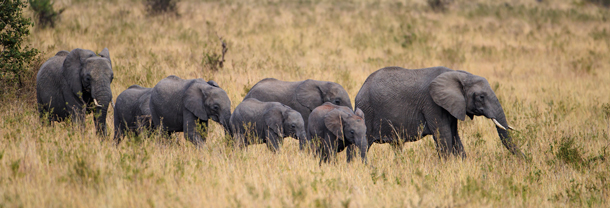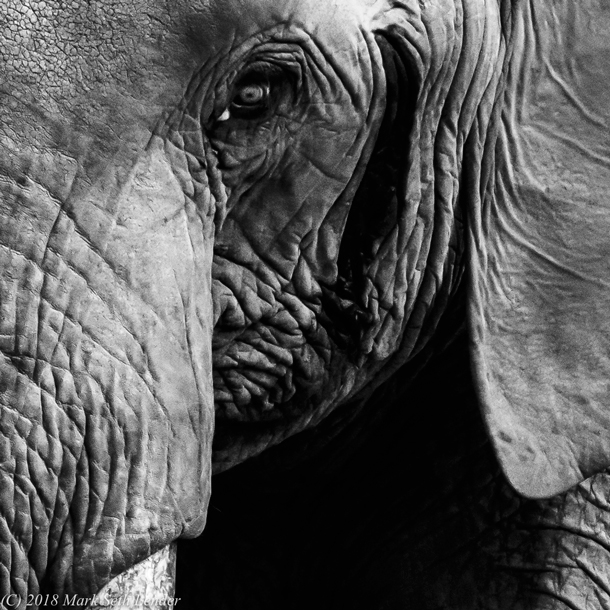Fearsome Bull Elephant Musth
Air Date: Week of April 12, 2019

Bull elephants tend to stay on the outskirts of the herd until mating season arrives. (Photo: Courtesy of Mark Seth Lender)
Bull elephants reach maturity at about 20 years. Typically, these bulls are gentle giants, who reside at the edges of the herd. That all changes during mating season when they come into musth. As Living on Earth’s Explorer in Residence Mark Seth Lender tells us, when that happens bull elephants can become a force of nature.
Transcript
CURWOOD: As the rhino poacher in South Africa found out, a close encounter with an elephant can be deadly or at least risky as Living on Earth’s Explorer in Residence, Mark Seth Lender, also discovered.
LENDER: A herd of elephants is crossing the road. All of the adults as is usual, female. We stop at a respectful distance and turn the motor off and let the elephants pass. Branches snap. Leaves rustle and give way as they climb up into the forest on the other side. After they can no longer be seen we can still hear them. The won’t turn back but we wait, giving them time, before we start the engine.
Just then, just as we start to move, a bull elephant in full musth breaches cover.
At first the bull does not even see us.
Then he does.
And everything changes.
His head swings his eyes go wide, lock onto the offending scene and he leans first towards then away from us.
“What? WHAT!”
He does not have to say it for us to hear it.
The driver jams the stick into reverse and the little jeep pulls back fifty yards, not fast enough to antagonize him more than we have already, but fast, and keeps the engine idling.
The bull elephant comes to exactly where we stood.
As if there is a line in the dirt.
Squints.
Lowers his head.

A close-up of an African Elephant. (Photo: Courtesy of Mark Seth Lender)
The ichor of arousal runs a dark river from his temples and down his checks. Standing in the shade he himself seems not elephant grey but almost black. Glossy black. Towering, ten feet over us.
We move back again. Further this time.
Again, he comes to where we were.
Once more we pull away and finally, it is enough. He gives us a head toss, kicks a cloud of dirt in our direction, and in an attitude of body and tusks and trunk that can only be described as disdain, walks away from us in his big, swaying, slow-motion elephant walk that is faster than the fastest man on earth can run, and blunts his way into the forest toward where the object of his ardor has decamped.
Lucky for us he had something on his mind.
Other than rage.
CURWOOD: Living on Earth’s Explorer in Residence, Mark Seth Lender.
Links
World Wildlife Fund | “African Elephant”
BBC Earth | “Male Elephants in Musth Fight for Dominance”
Living on Earth wants to hear from you!
Living on Earth
62 Calef Highway, Suite 212
Lee, NH 03861
Telephone: 617-287-4121
E-mail: comments@loe.org
Newsletter [Click here]
Donate to Living on Earth!
Living on Earth is an independent media program and relies entirely on contributions from listeners and institutions supporting public service. Please donate now to preserve an independent environmental voice.
NewsletterLiving on Earth offers a weekly delivery of the show's rundown to your mailbox. Sign up for our newsletter today!
 Sailors For The Sea: Be the change you want to sea.
Sailors For The Sea: Be the change you want to sea.
 The Grantham Foundation for the Protection of the Environment: Committed to protecting and improving the health of the global environment.
The Grantham Foundation for the Protection of the Environment: Committed to protecting and improving the health of the global environment.
 Contribute to Living on Earth and receive, as our gift to you, an archival print of one of Mark Seth Lender's extraordinary wildlife photographs. Follow the link to see Mark's current collection of photographs.
Contribute to Living on Earth and receive, as our gift to you, an archival print of one of Mark Seth Lender's extraordinary wildlife photographs. Follow the link to see Mark's current collection of photographs.
 Buy a signed copy of Mark Seth Lender's book Smeagull the Seagull & support Living on Earth
Buy a signed copy of Mark Seth Lender's book Smeagull the Seagull & support Living on Earth

